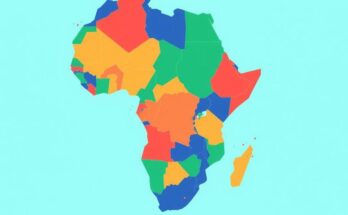Ecuador’s President Daniel Noboa questioned the integrity of the recent election following concerns about alleged irregularities. This claim is contested by the Organization of American States, which confirmed that results were consistent with their observations. Luisa González, his rival, also expressed distrust in the electoral process. Security concerns and accusations of armed groups affecting voting behavior have emerged, complicating an already tense political atmosphere.
Ecuador’s President Daniel Noboa has questioned the integrity of the recent presidential election’s first round, alleging significant “irregularities” despite securing a position in the second round. His comments emerged after a slim lead against his leftist rival, Luisa González, whom he suggested might have received support through coercion by armed groups. This unsubstantiated claim raised eyebrows among observers and analysts alike.
In response to Noboa’s assertions, the Organization of American States (OAS), responsible for monitoring the election, publicly refuted claims of irregularities. They stated, “the results presented by the National Electoral Council (CNE) of Ecuador coincide with the data obtained through the quick count conducted by the Mission, and remain within the margin of error.” This highlights OAS’s commitment to transparency and integrity in the electoral process.
Notably, Luisa González has also raised concerns regarding the electoral process, citing “inconsistencies” in the vote across certain provinces. However, González’s claims, echoing Noboa’s, lack supporting evidence and further contribute to a growing atmosphere of distrust regarding the election process. The European Union’s observation mission characterized the election as “transparent, well-organized, and peaceful,” challenging the narrative of fraud.
Security analyst Jean Paul Pinto commented on Noboa’s reliance on decrees to make significant decisions, including deploying armies to combat crime. Pinto suggested that such a management style reflects a misunderstanding of governance, equating it with private sector operations. He also observed that many voters supporting González likely do so out of opposition to Noboa rather than genuine support for her candidacy.
Pinto criticized Noboa’s claims regarding armed groups influencing voter behavior as potentially dangerous, indicating a broader narrative of national insecurity. His statement insinuates a lack of governmental control and sovereignty, raising concerns over Ecuador’s stability. The rising violence stemming from cartel activity further complicates the situation as societal trust in established democratic norms wavers with each election-related controversy.
In summary, President Noboa’s unfounded allegations regarding election irregularities have sparked significant debate amid a backdrop of increasing political turmoil in Ecuador. Both candidates have expressed distrust towards the electoral process, despite observations from international monitoring missions affirming its integrity. As security challenges continue to undermine democratic values, the country’s political landscape remains fraught with tension and uncertainty.
Original Source: www.cnn.com




